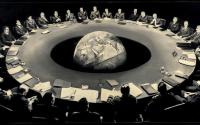12 October 2006Mahir Ali
When Anna Politkovskaya fell, there was a kind of hush even in the camp of her enemies - and there was no shortage of those. Chechnya’s pro-Moscow president Alu Alkhanov professed to be shocked, saying: “We had totally different views of the Chechen processes but Politkovskaya cared about the Chechen people.” The statelet’s puppet prime minister, Ramzan Kadyrov, - whom the journalist considered a state-sponsored criminal - described her murder as “an impediment to freedom of speech”, adding that although her “writings about Chechnya were not objective at times”, he “sincerely” felt sorry for her as a person.
Disingenuous as these condolences may be, they were marginally more gracious than the Kremlin’s reaction. Politkovskaya was not only widely known at home, she also boasted a higher international profile than any contemporary Russian journalist. On Saturday afternoon, she was shot dead, apparently by a hired killer, in the elevator of the Moscow apartment block where she lived. It wasn’t unreasonable to expect at least a token acknowledgement of the tragedy from the man who proudly presides over Russia’s fate. It didn’t come until Monday, and that too in a telephone conversation with George W. Bush. Vladimir Putin’s initial silence spoke volumes.
Chances are this wouldn’t have surprised, let alone bothered, Politkovskaya, who made no secret of the contempt in which she held the Russian president, “a product of the country’s murkiest intelligence service” who “has failed to transcend his origins and stop behaving like a lieutenant-colonel in the KGB”. The quote comes from her 2004 book, Putin’s Russia: Life in a Failing Democracy, a thorough excoriation of the present phase of Russia’s development (or, as she argues, regression towards some of the worst aspects of Soviet rule), which effectively began in 1999 with the launch of the second Chechen war.
Politkovskaya was initially sent to cover the conflict from the angle of the refugees it had generated, but soon enough became a passionate chronicler of its overall brutality and a relentless, searing critic not only of its effects on ordinary Chechens, but also of what it was doing to Russia. “Do you still think,” she wrote in Novaya Gazeta four years ago, “you should be supporting this war because of some aim that’s being pursued and so things wouldn’t get worse? Things cannot get worse. We have lost all sense of the morality and restraint we were taught in less tumultuous times, and something more vile and loathsome than we could ever imagine has erupted from the murkiest depths of our souls.”
Politkovskaya made it her mission to document all that she witnessed, and she stood out because she was virtually the only Russian journalist willing to do so. The 1993-96 Chechen war came to an end partly because media pressure propelled Boris Yeltsin towards a peace agreement. In the wake of glasnost, the newly un-Sovietised Russia boasted a diverse cacophony of voices in both print and electronic media, and many of them decried the birth of a new Afghanistan.
By the turn of the century, Putin had made sure he wouldn’t face the same inconvenience. Direct pressure was only one facet of the strategy. A series of bomb blasts in apartment blocks in Moscow and elsewhere, which were blamed on Chechen separatists, helped to change the public mood. Although it has never been conclusively proved, suspicions (bolstered by circumstantial evidence) persist that the explosions, which killed hundreds, were engineered by the FSB, the KGB’s post-Soviet successor. Putin headed the FSB before Yeltsin picked him as prime minister. Subsequently, the post-9/11 environment enabled Putin to pretend that Russia, too, was a wounded participant in the “war on terror”. Virtually every media voice was co-opted in support of what Moscow decreed to be “anti-terrorist” and “cleansing” operations - with the exception of Novaya Gazeta and its star reporter.
Politkovskaya had no sympathy for Islamic extremists such as Shamil Basayev and his ilk, but she could also clearly see the consequences of collective punishment and other forms of state terror perpetrated by the Russian army and Putin’s proxies in Grozny. “The truth is,” she told a British interviewer two years ago, “the methods employed in Putin’s anti-terrorist operation are generating a wave of terrorism the likes of which we have never experienced.”
Politkovskaya’s despatches in Novaya Gazeta were filled with accounts of torture, rape and extrajudicial killings, gleaned from victims and their relatives. Although her primary focus was the unspeakable suffering inflicted on innocent civilians, with villages being repeatedly ravaged because the army had no better counter-insurgency strategy, she also dwelt on the conflict’s dehumanizing effects on young Russia soldiers. Politkovskaya’s descriptions frequently conjure up a microcosm of Iraq.
She was also witness to conflicts within the Russian army, notably when a helicopter carrying a young general who had been sent by Moscow to investigate military abuses was shot down over Grozny in September 2001. The army blamed the act on separatists. Politkovskaya, who happened to be in Grozny and had spoken to the general shortly before he took off, knew that was impossible. She blamed entrenched army officers who had a great deal to conceal. Within days of the death threats got so serious that colleagues concerned for her safety persuaded Politkovskaya to go abroad.
A couple of months later, she told an interviewer in Vienna: “My children called me and told me that a woman was murdered in the entrance to our block of apartments: someone like me - the same age and height, grey-haired. I told them, ‘These things happen in our city’. They said, ‘No, it was meant to be you’.” They were right.
Politkovskaya had also faced mock execution and threats of rape at the hands of the FSB in Chechnya. And while on her way to cover the notorious school siege in Beslan in 2004, she was served a poisoned cup of tea that very nearly killed her. She was engaged at the time in an attempt to persuade the non-Islamist Chechen separatist leader Aslan Maskhadov to negotiate with the hostage-takers, an effort that came to naught because of the attempted murder. Over 300 died in the botched “rescue” operation that followed, more than half of them children.
It was a chilling repetition, in some ways, of the Moscow theatre incident two years earlier, when the authorities used poison gas against Chechen hostage-takers and killed scores of hostages in the process. In that instance, the terrorists had specifically asked to speak to Politkovskaya and, against the advice of family and friends, she had returned from exile for the purpose. She had no experience of comparable situations, but managed to persuade the militants to allow her to bring water and juice for the 800 or so hostages. She never quite got over her pangs of guilt at having been unable to do more.
It would be wrong to describe Politkovskaya as fearless: her extraordinary - some say irrational - courage lay in not allowing fear to overpower her sense of duty as a journalist. She felt obliged to record all that she saw, heard and thought: for posterity, but also as a possible spur to a peaceful settlement. The fact that it was such a lonely struggle does not reflect well on an intelligentsia spellbound by crony capitalism and cowed by Putin’s creeping authoritarianism. Mikhail Gorbachev aptly described her murder as “a grave crime against the country, against all of us”. He’s wise enough to know that the cold-blooded silencing of Politkovskaya diminishes all Russians - only a few hundred of whom took to the streets of Moscow on Monday to pay their tributes and register their protest, ahead of Politkovskaya’s funeral yesterday.
Some among them may have been wondering whether it was purely a coincidence that the uncompromising 48-year-old crusader was assassinated on Putin’s 54th birthday. It’s by no means inconceivable that some pathetic, two-kopeck courtier planned the removal of an irascible thorn as a gift for the president. Or for Ramzan Kadyrov, who had turned 30 two days earlier, making him eligible for the Chechen presidency he clearly covets - a post held not long ago by his father, Ahmad Kadyrov, who, according to his colleagues, once spoke of Politkovskaya as a “condemned woman”. Her encounter with the Grim Reaper came as she was working on yet another exposé documenting the younger Kadyrov’s involvement in torture.
Putin promised Bush a thorough investigation and Russia’s chief prosecutor is personally heading a probe into the dissident journalist’s murder. That, of course, is no guarantee of a result, and Novaya Gazeta - which devoted its issue on Monday entirely to eulogizing Politkovskaya - has announced an investigation of its own. The question “Who killed Anna Politkovskaya?” may yet resonate down the decades. But so will her words, her devastating indictments of crimes against humanity committed in the name of all Russians. The fact that none of her books - Putin’s Russia, A Dirty War and A Small Corner of Hell - has been published in her homeland serves only to reinforce her assessment that “Russia continues to be infected by Stalinism”.
In a tribute at the weekend, Oleg Panfilov, director of the Moscow Centre for Journalism in Extreme Situations, pointed out: “Whenever the question arose whether there is honest journalism in Russia, almost every time the first name that came to mind was Politkovskaya.” That could serve as a suitable epitaph, except that Politkovskaya herself, somewhat prematurely, came up with a better one five years ago during her exile in Vienna: “I worked so hard to shine a light on the events in this war, and now they have stopped me.”
Email: [email protected]
http://www.zmag.org/content/showarticle.cfm?SectionID=31&ItemID=11173






